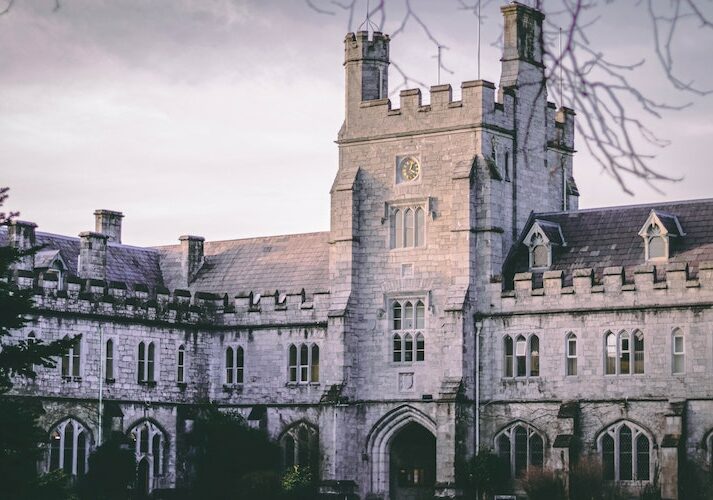Exploring the idea of buying property in Ireland as an American will reveal a wealth of opportunities in a country known for its stunning landscapes, cultural richness, and stable average prices for real estate.
This guide will help you understand the Irish property market, provide insights on the best places to buy property in Ireland, and detail the average mortgage costs from Irish mortgage providers. We’ll also go through the legal aspects of Irish real estate investment and the best property websites listing Irish properties.
Why buy property in Ireland?
 Stable property market
Stable property market
The Irish property market is stable and established, especially in major cities like Dublin and Cork. Most foreign nationals buying property in Ireland see its real estate market as a safe long-term investment that maintains strong property demand.
 Diversification of investment portfolio
Diversification of investment portfolio
Investing in Irish real estate offers diversification to a global investment portfolio. With the potential for stable rental income from Irish and non-Irish citizens, the market presents an attractive opportunity for investors seeking to improve financial security.
 Favorable legal system
Favorable legal system
Ireland’s legal process for property ownership is transparent and investor-friendly for American and British buyers. Comprehensive property rights and a well-established legal system provide a sense of security for American investors. Foreign property buyers do not face additional legal restrictions.
 Low taxes
Low taxes
Ireland offers a favorable tax environment, including a relatively low corporate tax rate of 12.5 percent and a high tax-free threshold for Irish residents over 65, making it an appealing destination for American retirees seeking advantageous tax conditions and financial incentives.
 Access to the EU
Access to the EU
Being an EU member, acquiring property in Ireland, and obtaining an Irish residence permit opens the door to the European Union, eventually leading to eligibility for an EU passport upon receiving Irish citizenship.
Can Americans buy property in Ireland?
Americans may purchase real estate in Ireland. There are no limits on foreigners acquiring property in Ireland and no citizenship or residence requirements for buying property in the country. But, as with any overseas property purchase, buyers should be aware of various legal and financial factors, such as taxes, solicitor fees, non-resident visa restrictions, and differences in property laws between Ireland and the United States.
Americans must get legal and financial counsel to ensure that the purchasing process goes well and that they are entirely informed of their rights and duties as foreign buyers.
Furthermore, it is critical to have a solid understanding of the local property market and the locations you are interested in considering for your purchase. The costs involved might vary significantly based on the region’s popularity amongst American buyers and the type of property and home insurance required.
While there are significant distinctions and challenges to buying property in Ireland as an American, the procedure is doable and may be a terrific financial opportunity. You can manage the purchase process and enjoy owning your piece of the Emerald Isle with the correct direction and help.
Eight Types of Homes in the Ireland to Purchase
Given their historical ties, Ireland and the UK have common architectural elements, leading to resemblances in the types of properties present in both countries.
Detached houses
Detached houses in Ireland are standalone properties sharing no walls with neighboring houses. These homes feature separate gardens in the front and back of the property and are ideal for American families with children.
Semi-detached houses
Irish semi-detached houses share one side of a neighboring home like an end-of-terrace property. Semi-detached houses are designed to optimize space and are common among middle-income families. They make suitable homes for Americans seeking a combination of space and affordable property prices.
Terraced houses
Terraced houses epitomize the traditional residences of the British Isles, featuring contiguous rows of homes connected by a single wall on each side. Due to their compact size, these homes are generally more affordable. Still, American investors can pay a high average price to buy a terrace house in the center of Dublin or other popular Irish cities.
Flats
Irish real estate agents recognize flats, known as apartments in the US, as versatile and sought-after residential options that cater to various lifestyles and preferences. Ireland’s property market offers numerous flats throughout the country, suitable for solo investors and couples.
Cottages
Embodying tradition and predominantly located in rural Ireland and the UK, cottages showcase the finest examples of British designs that have evolved over centuries. A Typical cottage features are thatch roofs, casement windows, thick walls, and spacious flowery gardens.
Bungalows
Ireland features single-story dwellings known as bungalows, presenting a unique, in-demand housing alternative. A stair-free environment makes these homes perfect for individuals with mobility challenges or those desiring a living space that is easier to navigate.
Manors
Topping the list regarding property cost, manors, often historic houses, are iconic symbols of luxury and opulent living in Ireland. Given that some manors trace their land registry origins and property’s legal deeds back centuries, opportunities to purchase one through an Irish property search may be limited.
What's the property market like in Ireland?

According to the Central Statistical Office of Ireland, the national residential property price index climbed by 2.9 percent in the 12 months preceding November 2022. Ireland has continued to see a steady rise in house prices over the last few years. Nonetheless, it is essential to note that property prices vary greatly depending on location, with Dublin and other big cities often seeing higher costs than rural locations.
The Irish housing market is predicted to be steady in 2024, with moderate price rises expected in the future. With the Irish economy projected to revive in the subsequent years, the housing market is also expected to stabilize.
Generally, the Irish property market is considered a solid investment option for anyone seeking to acquire real estate in a stable and rising demand, and all aspects are firmly regulated by the Property Services Regulatory Authority (PSRA). But, like with any investment, it is critical to undertake complete research and obtain expert counsel before making any decisions.
How to buy real estate in Ireland?
If you are an American trying to buy real estate in Ireland, you must first grasp the legal requirements. Legal procedures in the buying process include:
- Hiring a solicitor
- Acquiring a Personal Public Service (PPS) number, (if you want to work or invest in Ireland),
- Paying stamp duty
- Registering the property
The legal requirements can be complicated and may differ based on your specific circumstances. Getting the assistance of a skilled and experienced solicitor may help ensure that you completely understand your duties and rights as a buyer, as well as make the purchasing process as easy and stress-free as possible.
Step-by-Step Guide to Buying Property in Ireland as an American
- Research the Irish property market: House hunting in Ireland means researching its property market, including property valuations and trends in different regions. Common Irish property websites include:
- Daft
- MyHome
- SherryFitz
- Engage a real estate agent: Getting an Irish real estate agent involved with a property search in Ireland enhances the prospects of navigating the intricacies of the market, revealing opportunities that may go undiscovered. You can use the Irish Law Society’s website to find reputable Irish estate agents.
- Hiring a solicitor: It is strongly advised that you employ a solicitor to assist you with the purchase procedure. An attorney can assist you in navigating the legal processes and ensure all required paperwork is in order.
- Choose the best location: Remember your personal circumstances and requirements while selecting a spot for your Irish home. To work in Ireland, you should seek houses near your workplace. If it is an investment, consider places in a prominent tourist location.
- Get a Personal Public Service (PPS) number: A PPS number is a unique identification number the Irish government provides. A PPS number is required if you intend to work or invest in Ireland. Though a PPS number is not mandatory to buy a home in Ireland, it can make the process go more smoothly and may be required to receive formal mortgage approval as a foreign national.
- Obtain financing: If you intend to finance your home purchase, you may have the option to do so through several different mortgage providers in Ireland. An Irish mortgage provider will request information such as proof of income, assets, and other factors contributing to creditworthiness. An Irish mortgage advisor can assist in securing a mortgage loan to buy Irish property.
- Sign a purchase agreement: Upon an agreed purchase price, your solicitor will issue a “subject to survey” contract, after which you’ll pay a booking deposit. The transfer process cannot begin until this deposit has been paid but is refundable until final agreements are signed.
- Finalize your purchase: Once your solicitor and the seller’s solicitor have assessed all legal documentation, you will legally commit to the purchase after signing the final contracts. Pulling out of the sale at this point will foreflight your deposit. You’re also protected should the seller back out of the deal.
- Pay stamp duty: You must pay stamp duty when purchasing property in Ireland. The amount of tax varies from 1 percent to 10 percent, according to the property’s purchase price, how many homes you own, and the property type.
- Be careful of taxes: Other than stamp duty, additional taxes and fees may be involved with purchasing property in Ireland. Ensure you are aware of Irish tax regulations and understand your responsibilities as a property owner.
- Register the property: After the sale, you must register the property with the Property Registration Authorities (PRA). The PRA is in charge of keeping a public record of all property ownership in Ireland.
Financing a Property Purchase in Ireland
UK citizens and foreign expats with Irish residence permits generally find it easier to obtain a mortgage in Ireland. To regulate mortgages, the Central Bank of Ireland has implemented measures that determine the maximum amount lenders can loan to borrowers using:
- Loan-to-Value (LTV): The percentage of the property’s value buyers can borrow
- Loan-to-Income (LTI): Limits how much buyers can borrow based on their gross income.
Banks providing mortgage services to non-resident foreigners include:
- Permanent TSB: Provides mortgage options to non-residents from specific EU countries.
- Mortgages Direct: Mortgage brokers assisting non-residents seeking mortgages for Ireland homes.
- Allied Irish Bank: Provides mortgage products to specific foreign nationals.
- Choice Personal Loans: Mortgage brokers specializing in assisting expat buyers with financing a property purchase in Ireland.
While there are standard measures, individual mortgage lenders set their own terms for loans, mortgage payments, and repayment timelines regarding foreign borrowers. Obtaining a buy-to-let mortgage poses more challenges than securing a mortgage for purchasing a home as a primary residence.
Taxes and Fees for Buying Property in Ireland

Legal fees: Hiring a solicitor to manage the legal elements of the property purchase might range from 1 percent to 2 percent of the property value, according to prominent estate agents such as MyHome.
Survey fees: When purchasing a home, hiring a surveyor to assess potential concerns is critical. A survey can range in price from €500 to €1,500, depending on the sort of study required.
Valuation fees: Based on a quote from Irish property website Bonkers, a property valuation fee is between €150 and €250.
Registration fees: When the transaction is completed, you must register the property with the Irish Property Registration Authority. Typically, the registration cost is 1 percent of the property value.
Property tax: Local Property Tax (LPT), the annual property tax in Ireland, is charged at a rate of 0.1029 to 0.3 percent of the property’s value. Irish properties are assigned bands from 1 to 19 based on their assessed value, with Band 1 costing €90 per annum for properties worth under €200,000 and 19 costing €2,721 for properties worth €1.66 to €1.75 million. Properties worth over €1.75 million are charged the highest rate of 0.3 percent.
In addition to the fees listed above, other expenditures may be considered when purchasing property in Ireland. For example, you may have to pay arrangement costs or mortgage insurance payments if you’re getting a mortgage. If you buy the property, you may need to pay for house insurance, electricity bills, and maintenance fees.
Things to Consider When Buying Property in Ireland
There are various crucial elements to consider before purchasing property in Ireland to ensure that you make an educated decision. These are some essential points to remember:
Property types offered: Apartments, townhouses, semi-detached and detached houses, and rural estates are available in Ireland. Considering the property that would best meet your demands and budget is critical.
Property condition: While inspecting homes, carefully evaluate the property’s condition, including the roof, windows, heating and plumbing systems, and other critical elements. Assess whether any repairs or improvements are required and budget accordingly.
Location: Evaluate the property’s location regarding amenities, transit, schools, and other relevant variables. Consider your desired lifestyle and whether the area is a suitable fit for you.
Legal concerns: Be aware of any legal difficulties related to the property, such as boundary disputes or planning clearances. A solicitor should perform rigorous due diligence checks to detect potential legal challenges.
Risks of buying property in Ireland: Buying a property can be risky and may come up with some unforeseen problems. Unexpected maintenance expenditures, property market variations, and economic condition changes may all impact your ability to sell the home.
Plans for the future: Evaluate your property’s future goals. Will you rent or utilize the property as a vacation home? Would you consider retiring there? These elements can influence your decision-making process and assist you in determining if a particular property is a suitable fit for your requirements and ambitions.
Overall, purchasing property in Ireland as an American can be complicated. Still, by considering these aspects and working with experienced specialists, you can make an informed decision and discover the ideal house for your requirements.
Best Places to Purchase Real Estate in Ireland
Ireland is a lovely nation with a rich cultural legacy, breathtaking natural scenery, and lively cities. If you’re considering purchasing a home in Ireland, you’ll have several alternatives based on your budget, lifestyle preferences, and investment goals. Here’s a rundown of some of Ireland’s most significant areas to buy real estate.
Dublin
Ireland’s capital city, Dublin, has a broad assortment of homes, ranging from classic Georgian townhouses to contemporary apartments. The city is well-known for its vibrant cultural scene, which includes a plethora of theatres, music venues, and galleries. It’s also a commercial and education center, with numerous significant colleges and global firms headquartered there. Yet, housing costs in Dublin may be costly, so it’s critical to analyze your budget and investment goals before you make a purchase.
Cork
Situated on Ireland’s southern coast, Cork is noted for its beautiful medieval center, thriving food and beverage industry, and closeness to picturesque coastal landscapes. The city is popular with both residents and expats, and its residences range from Victorian terraced houses to modern-built flats. Property costs in Cork might be lower than in Dublin, making it an appealing alternative for first-time purchasers.
Galway
Galway is a lovely city on Ireland’s west coast, famed for its traditional Irish music culture, cultural festivals, and historic sites. The town has a variety of homes ranging from modest cottages to sophisticated townhouses and is a popular location for tourists and those looking for a relaxed lifestyle. Property costs in Galway might be costlier than in other regions of Ireland, but the city provides a one-of-a-kind cultural experience that is difficult to get elsewhere.
Limerick
Limerick, located in Ireland’s mid-west area, is a dynamic city with a rich history and a variety of cultural attractions. The town offers various properties, from classic terrace homes to new construct apartments. It is recognized for its low property costs compared to other major Irish cities. Limerick is also a center for industry and innovation, with numerous significant technology businesses headquartered there.
When deciding where to buy property in Ireland, keep your budget, lifestyle preferences, and investment goals in mind. Each of these locations has its own set of benefits and problems, and working with experienced experts, such as a local estate agent and solicitor, can help you make an educated selection and discover the best property for you.
Average House Prices of Irish Homes
According to the Central Statistical Office of Ireland, the price of a median home in the 12 months preceding January 2023 was €305,000. Statista compiled data for the average asking price for houses in specific cities in Ireland.
Property Type | Cork | Galway | Limerick |
One-bedroom house | €149,000 | €148,000 | €121,000 |
Two-bedroom house | €185,000 | €184,000 | €150,000 |
Three-bedroom house | €271,000 | €269,000 | €220,000 |
Four-bedroom house | €471,000 | €468,000 | €382,000 |
Five-bedroom house | €497,000 | €495,000 | €404,000 |
Frequently Asked Questions About Buying Property in Ireland
Can a foreigner buy property in Ireland?
Irish law allows foreigners to buy property in Ireland without restrictions. This openness in the real estate market makes it accessible to international buyers, facilitating a straightforward process for those interested in investing in Irish properties.
Is Ireland a good place to buy a property?
Ireland can be a fantastic destination for acquiring real estate, especially in desired areas like Dublin, Cork, Galway, and Limerick. However, property costs can vary significantly based on location and the kind of property, so it is critical to conduct extensive research and speak with professionals before purchasing.
How much money do you need to buy a house in Ireland?
The amount required to buy a house in Ireland varies considerably based on location and property type. While planning for a house purchase, buyers should include additional expenditures such as stamp duty, legal fees, and property taxes.
Can I get residency in Ireland if I buy a house?
Anybody can buy property in Ireland, but owning Irish property does not grant the right to live there.
Do I have to pay tax if I buy a house in Ireland?
Buying a home in Ireland will require paying taxes on the purchase, including VAT, stamp duty, and registration fees. Irish real estate owners must also pay Local Property Tax (LPT), an annual tax charged on privately owned real estate in Ireland.



